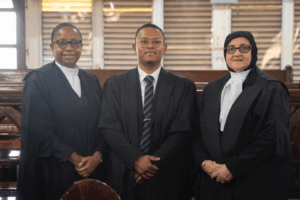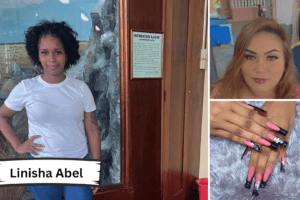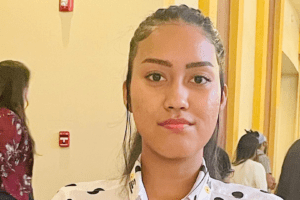Breast cancer is more than a physical battle. It brings significant emotional and psychological challenges that can affect patients and their families throughout their journey.

Dr. Moses Roderique, a Doctor of Clinical Psychology, shared with ThingsGuyana the mental health struggles faced by breast cancer patients and offered expert insights on navigating these challenges.
EMOTIONAL RESPONSES TO A BREAST CANCER DIAGNOSIS
Upon receiving a breast cancer diagnosis, individuals often experience a whirlwind of emotions.
Shock and disbelief are common initial reactions.
These feelings are often accompanied by fear and uncertainty about the future. Many patients also grapple with a sense of loss—not just of their health but of their identity and life plans.
Additionally, guilt may arise, especially when patients worry about how their diagnosis impacts their loved ones.
HOW PSYCHOLOGICAL IMPACT DIFFERS BETWEEN PATIENTS AND FAMILIES
According to Dr. Roderique, the emotional toll of breast cancer affects not only the patient but also their family.
Patients may deal with severe emotional distress about treatment, body image, and fear of recurrence.
Family members, on the other hand, may feel powerless, anxious about their loved one’s health, and face shifts in family dynamics.
Anticipatory grief, or the fear of losing a loved one, can weigh heavily on families.
FEAR OF RECURRENCE: A LINGERING CONCERN FOR SURVIVORS
For many breast cancer survivors, the fear of recurrence casts a long shadow over their lives.
This fear can result in heightened anxiety, hyper-vigilance, or even avoidance behaviours.
Survivors may obsess over every symptom or avoid health checkups due to anxiety. To address this, this Guyanese psychologist recommends mindfulness practices and relaxation techniques to help survivors manage their fear.
Providing factual information about the survivorship phase and regular follow-ups can give patients a sense of control.
COPING WITH THE EMOTIONAL STRAIN
Breast cancer patients face significant emotional strain, but several coping strategies can help them manage the psychological load.
I often recommend mindfulness practices like meditation and yoga.

Dr. Moses Roderique
He also highlighted the benefits of journaling, which provides a therapeutic outlet for expressing emotions.
Support groups are invaluable as well, offering patients a sense of community and shared understanding.
Physical activity is another key component. As exercise releases endorphins that help alleviate anxiety and depression.
MENTAL HEALTH SUPPORT DURING TREATMENT
The treatment phase can be especially taxing for breast cancer patients, making mental health support crucial.
Counseling services, peer support groups, and stress management workshops are effective in helping patients cope.
In Guyana, he advocates for integrating mental health professionals into oncology care to provide immediate psychological support.
Community outreach programmes can also play a critical role by educating patients and their families about emotional well-being throughout treatment.
THE PSYCHOLOGICAL TOLL OF CHEMOTHERAPY AND SURGERY
Undergoing treatments like chemotherapy or surgery introduces unique mental health challenges.
Patients often experience side effects such as fatigue and changes in physical appearance, which can lead to body image issues and decreased self-esteem.
Anxiety about treatment outcomes and the unpredictability of responses can exacerbate feelings of helplessness.
These stressors can lead to emotional exhaustion, isolation, and even depression.
LIFE AFTER TREATMENT: THE SURVIVORSHIP PHASE
While completing treatment brings relief, it also ushers in new emotional challenges.
Some survivors feel a renewed sense of purpose, but others may struggle with lingering fears of recurrence and adjusting to life after cancer.
Psychological support remains crucial during this survivorship phase. It helps survivors redefine their identities and establish new goals. Support groups and individual counselling provide survivors with the tools to process their experiences and build resilience for the future.
REBUILDING SELF-ESTEEM AND BODY IMAGE
For survivors who have undergone treatments such as mastectomies, rebuilding self-esteem and body image can be a daunting process. Dr. Roderique recommends psychoeducation as a first step.
Understanding the effects of cancer on body image is crucial for patients.
Connecting with others who have had similar experiences through support groups can also foster solidarity and boost self-confidence.
Therapeutic interventions focused on body image can help survivors reframe their perspectives and practice self-compassion.
HANDLING THE LONG-TERM EMOTIONAL AFTERMATH
Cancer survivors often face long-term emotional challenges, including anxiety and depression, and Dr. Rodrique noted that a strong support system is essential.
This includes mental health professionals, family, friends, and support groups. Physical activity and hobbies also play a role in managing symptoms, as do cognitive-behavioural techniques that challenge negative thought patterns.
Establishing a routine that incorporates self-care is key to sustaining emotional well-being.
THE ROLE OF FAMILY AND FRIENDS
Family and friends are vital sources of emotional support for breast cancer patients.
Their presence can reduce feelings of isolation and provide a sense of comfort.
He encourages loved ones to practice active listening and show empathy without judgment.
Simple acts, like accompanying patients to appointments or checking in regularly, can have a tremendous impact.
SUPPORTING PATIENTS IN RURAL AREAS
In rural areas of Guyana, where access to care may be limited, community support becomes even more important.
Local support groups and outreach programs focused on mental health education can make a significant difference.
Training community health workers to identify psychological needs and offering telehealth services are additional ways to provide support in remote areas.
Community-based initiatives that foster compassion and companionship can help patients feel valued and supported.
ADVICE FOR CAREGIVERS
Supporting a loved one with breast cancer can be emotionally taxing for caregivers as well.
It’s important for caregivers to prioritise their own emotional health.
He recommends that caregivers seek counselling or support groups and maintain healthy boundaries when needed.
Engaging in personal interests, taking breaks, and communicating openly about feelings can help prevent burnout.
This annual observance highlights the importance of early detection, treatment, and research advancements that aim to save lives. It is also a moment to honour the strength of survivors, remember those we’ve lost, and come together in solidarity to fight this disease.







